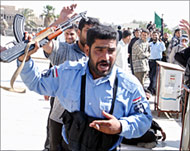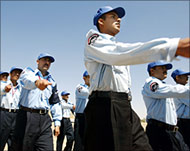On the beat with a plastic helmet
“The Americans have now shown themselves to be the enemies of all Iraqis,” read the leaflets distributed to the occupation-funded Iraqi police and army recruits. “To serve the US interests is to act as a traitor to your homeland.”

These pleas from supporters of Shia cleric Muqtada al-Sadr have evidently not fallen on deaf ears.
Although Paul Bremer and his occupation authority in Baghdad claim to have been aggressively pursuing a policy of “Iraqification” within the security forces, to date the project has not exactly been a success.
The total death count for Iraqi police and military that have been slain while serving alongside US-led occupation troops now stands above 400 with another 1500 having been seriously wounded.
As the series of bombs that devastated the southern Iraq city of Basra in mid-April indicates, the attackers are heavily targeting these newly constituted Iraqi police and civil defence forces.
Admittedly, with post-war unemployment still around 80% there has been no shortage of recruits anxious to earn the relatively princely sum of $54 a month.
 |
|
Some Iraqi recruits in Falluja and |
However, determining the calibre and conviction of these Iraqi recruits has proven to be somewhat problematic.
In a recent statement to the media, US Major General Martin Dempsey admitted that during the recent clashes, their Iraqi allies had been less than fully reliable.
“About 50% of the security forces that we built over the past year stood tall and stood firm,” said General Dempsey.
“About 40% of them walked off the job because they were intimidated and about 10% actually worked against the US.”
Speedy training
A typical Iraqi policeman or soldier is processed through a brief three-week training course before being issued an armband and a Kalashnikov and sent off to man the frontline checkpoints.
While some of the Iraqi Civil Defence Corps (ICDC) units are issued with ridiculous looking plastic helmets, there has been very little provision made by the occupation authority to outfit the Iraqi security forces with any real protective clothing.
 |
|
Patrol vehicles leave Iraqi police |
American occupation soldiers protecting the same installations will be wearing Kevlar helmets, and body armour while sitting in reinforced concrete guardhouses whereas their Iraqi counterparts who conduct the first line of vehicle searches, are afforded no such protection.
In lieu of armoured patrol vehicles, the Iraqi security forces simply mount machine guns on small Nissan civilian pickup trucks.
Moreover, occupation forces still do not totally trust these Iraqi security units to operate independently.
Highway searches
On 7 April, after a reported ambush against US occupation troops in Tikrit, vehicle and personnel searches had been established on the Baghdad-Mosul highway.
American armoured vehicles provided the support and US occupation soldiers closely observed as members of the ICDC conducted the actual searches.
It was a time-consuming process, which often took over 90 minutes for us to advance through a single checkpoint.
Prior to the war, one could expect to transit the 360-kilometre stretch of highway between Baghdad and Mosul in just over three hours.
Now, given the restrictions imposed by both the occupation forces and the attacks of the Iraqi resistance one can expect that same journey to take at least twice as long.
Under the watchful eye of the Americans, the ICDC members seemed to be duly carrying out their expected duty.
 |
|
After just three weeks of training |
Earlier that day, however, when we passed through an independently conducted ICDC checkpoint near Balad just north of Baghdad, the Iraqi soldiers had waved us over onto the paved shoulder.
I had thought they wanted to search the car, but instead the lead soldier had asked me if I had any food.
When I replied in the negative, he lowered his voice and asked, “Mister, mister baksheesh?”
Sensing that I was about to refuse on principle, Husayn, my driver, quickly handed the man 2000 Dinars ($1.50) and we were on our way.
Former officers hired
Prior to the war, we had often been stopped by Iraqi soldiers requesting food, money, or a lift to the next town.
The sanctions had impoverished many sectors of the Iraqi society and army recruits were no exception.
Moreover, in their haste to reconstruct a self-sufficient Iraqi security force, American-led occupiers have rehired many former officers and police chiefs back into their old jobs.
But despite the three-week training course and new uniforms, it seems that little has been done to prevent the spread of corruption to the ranks of the new Iraqi military.
“Believe me if there are no US troops in sight, clearing an ICDC checkpoint is very easy,” said Husayn, a regular driver on the Mosul-Baghdad route. “Baksheesh will still get you anything in Iraq.”